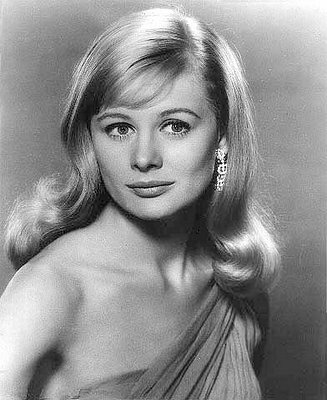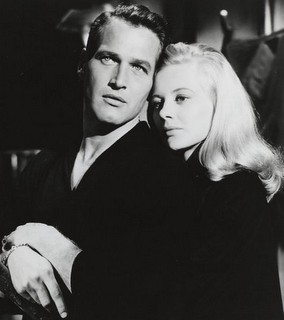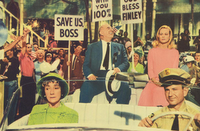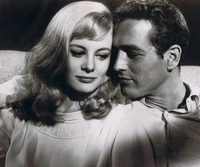 As of today's entry into the Supporting Actress Sunday-palooza, StinkyLulu will be introducing a new feature: a rough accounting of the number of scenes and total screen time in each performance. See, as some of you might recall, just a week ago, Lulu guest-posted on The Film Experience a little piece about the relative scale of "supporting" performances. The resulting discussion that raged in comments suggested to StinkyLu that Supporting Actress Sundays really should include this basic information, if only to round out things a little. Now, StinkyLulu's not promising that these numbers are agonna be scientific, or anywhere near it. This'll just be a rough summary of (a) the total screen time of the performance, (b) the number of scenes in which the nominated performer appears, and (c) percentage of the film's total screen time inhabited by the nominated performance. Only in exceptional circumstances (ie. for the really really short performances) will StinkyLulu undertake a line-count.
As of today's entry into the Supporting Actress Sunday-palooza, StinkyLulu will be introducing a new feature: a rough accounting of the number of scenes and total screen time in each performance. See, as some of you might recall, just a week ago, Lulu guest-posted on The Film Experience a little piece about the relative scale of "supporting" performances. The resulting discussion that raged in comments suggested to StinkyLu that Supporting Actress Sundays really should include this basic information, if only to round out things a little. Now, StinkyLulu's not promising that these numbers are agonna be scientific, or anywhere near it. This'll just be a rough summary of (a) the total screen time of the performance, (b) the number of scenes in which the nominated performer appears, and (c) percentage of the film's total screen time inhabited by the nominated performance. Only in exceptional circumstances (ie. for the really really short performances) will StinkyLulu undertake a line-count.So, without further ado, let's get to the Supporting Actress who'll help Lulu inaugurate this new feature and who just happens to be the reliably delightful...


...Shirley Knight in Sweet Bird of Youth (1962)
23 minutes on screen
6 scenes (including 2 wordless flashbacks)
19% of film's total screen time
Now, StinkyLulu would never claim that Shirley Knight is one of the greatest actresses of her era. Her filmography just doesn't hold up next to -- say -- a Burstyn, a Maclaine or a Fonda. But. StinkyLulu would staunchly proclaim that Knight is without a doubt one of the greater actresses of her generation, even though most of her best work has been captured not on celluloid but on the boob tube. Anyway. StinkyLulu loves Shirley Knight. That's that. And it's always a treat to see her radiant pre-plumpness, which is at its near best in 1962's Sweet Bird of Youth. (To see the full force of early Shirley, check out her performance as Lula in 1967's Dutchman & prepare to have your mind blown.)
Sweet Bird of Youth -- like most cinematic adaptations of Tennessee Williams at midcentury -- is very nearly a mess. Most essentially, the story's about Chance Wayne (Paul Newman), an uncommonly attractive young man who has no real idea who he is, what he wants, or how to get a clue. At the story's outset, Chance -- a fading gigolo by trade -- skids back into his hometown on the Mississippi Gulf Coast in the company of the Princess Cosmonopolous --
 aka the gruesomely addicted actress Alexandra del Lago (Geraldine Page) -- to get "his girl" and take her away with him to fame and fortune. Chance's girl is Shirley Knight's character -- the improbably named Heavenly Findley (bummer of a birthmark, huh). Of course, this ain't the first time Chance has "come back" for Heavenly and the film demonstrates (through insipid flashbacks) just how viciously Heavenly's father, the nasty Boss Findley (Supporting Actor winner, Ed Begley), has gotten rid of Chance each time. Sweet Bird of Youth is an overripe story, chock full of sordid secrets and shocking confrontations, and yet...Chance Wayne remains one of Williams' most mysterious and evocative protagonists and Paul Newman's performance in the part is a recurrent revelation. (Shirley Knight was one of the few newcomers to film production, which was rich with carryovers from the acclaimed broadway cast.)
aka the gruesomely addicted actress Alexandra del Lago (Geraldine Page) -- to get "his girl" and take her away with him to fame and fortune. Chance's girl is Shirley Knight's character -- the improbably named Heavenly Findley (bummer of a birthmark, huh). Of course, this ain't the first time Chance has "come back" for Heavenly and the film demonstrates (through insipid flashbacks) just how viciously Heavenly's father, the nasty Boss Findley (Supporting Actor winner, Ed Begley), has gotten rid of Chance each time. Sweet Bird of Youth is an overripe story, chock full of sordid secrets and shocking confrontations, and yet...Chance Wayne remains one of Williams' most mysterious and evocative protagonists and Paul Newman's performance in the part is a recurrent revelation. (Shirley Knight was one of the few newcomers to film production, which was rich with carryovers from the acclaimed broadway cast.) At first glance, Heavenly seems to be there to be an embodied paragon of Southern white womanhood, but Shirley Knight's performance -- through languid gestures and startling anger -- immediately flags that there's something greater at stake for this belle. As the idealized love that Chance just can't shake, Knight's Heavenly emerges as perhaps the most interesting of Williams' delicate feminine flowers. And that's in no small part because, in Sweet Bird of Youth, even Heavenly has a sordid past (an illegitimate, terminated pregnancy via Chance in the screen version; a hysterectomy as a result of venereal disease via Chance on stage).
At first glance, Heavenly seems to be there to be an embodied paragon of Southern white womanhood, but Shirley Knight's performance -- through languid gestures and startling anger -- immediately flags that there's something greater at stake for this belle. As the idealized love that Chance just can't shake, Knight's Heavenly emerges as perhaps the most interesting of Williams' delicate feminine flowers. And that's in no small part because, in Sweet Bird of Youth, even Heavenly has a sordid past (an illegitimate, terminated pregnancy via Chance in the screen version; a hysterectomy as a result of venereal disease via Chance on stage).  In the film, Knight's portrayal tracks Heavenly's evolution from the naive schoolgirl to the weary young woman, still beautiful but nearly worn out by the uses she has been put by her father's political drive. Knight's best work can be seen in her first scene opposite her father, in which she confronts his hypocrisy and is humiliated for it. Here, in a scene that could merely be saucy or sassy, Knight conveys Heavenly's complicated intelligence and deep sadness, which her father simply cannot see. Knight's performance also avoids easy pitfalls when she tries to get Chance to give up on her. Knight's Heavenly knows that Chance is nearly as dumb as a post (but in a sweet way) and that he's getting far out of his depth. Knight's eyes convey all of this pity and fear and sadness -- too bad she has to do all this while driving a motorboat and hollering to Chance who's climbing a lighthouse. And even though the filmmakers tweak the story to somehow give it a happy romantic resolution (and thereby divesting it of its nearly classical gory tragedy) the film works as well as it does largely because Knight's Heavenly actually comes off as an unusually intelligent, even special young woman.
In the film, Knight's portrayal tracks Heavenly's evolution from the naive schoolgirl to the weary young woman, still beautiful but nearly worn out by the uses she has been put by her father's political drive. Knight's best work can be seen in her first scene opposite her father, in which she confronts his hypocrisy and is humiliated for it. Here, in a scene that could merely be saucy or sassy, Knight conveys Heavenly's complicated intelligence and deep sadness, which her father simply cannot see. Knight's performance also avoids easy pitfalls when she tries to get Chance to give up on her. Knight's Heavenly knows that Chance is nearly as dumb as a post (but in a sweet way) and that he's getting far out of his depth. Knight's eyes convey all of this pity and fear and sadness -- too bad she has to do all this while driving a motorboat and hollering to Chance who's climbing a lighthouse. And even though the filmmakers tweak the story to somehow give it a happy romantic resolution (and thereby divesting it of its nearly classical gory tragedy) the film works as well as it does largely because Knight's Heavenly actually comes off as an unusually intelligent, even special young woman. Shirley Knight's performance as Heavenly is certainly not the best Supporting Actressing of this year. (Not even of this film, as Madeleine Sherwood chacha and Mildred Dunnock dither their respective circles around the whole cast in small but instrumental roles.) But Shirley Knight is smart, sweet, surprising and sexy as Heavenly, a sublimely difficult role which also happens to be the lynch(!)-pin determining whether and how Sweet Bird of Youth makes any sense at all. Indeed, it's great work from one of the greater actresses of her generation...
Shirley Knight's performance as Heavenly is certainly not the best Supporting Actressing of this year. (Not even of this film, as Madeleine Sherwood chacha and Mildred Dunnock dither their respective circles around the whole cast in small but instrumental roles.) But Shirley Knight is smart, sweet, surprising and sexy as Heavenly, a sublimely difficult role which also happens to be the lynch(!)-pin determining whether and how Sweet Bird of Youth makes any sense at all. Indeed, it's great work from one of the greater actresses of her generation...*****
Be sure to click back on Wednesday and on Sunday for the final two contenders in July's Supporting Actress Sundays as well as the 1962 Supporting Actress Smackdown! Will it be a rout (ala Lansbury) or will something more surprising happen... Tune in to see the fireworks!

5 comments:
Thanks for another great SA overview. Love the addition; my criteria for judging screen time is looking at the total time the actress is on camera or audible, as sometimes a long scene will only feature the player speaking a few lines, and giving the lead some "reaction shots."
It's been interesting to review some performances to access onscreen time in regards to supporting roles. For example, I've seen Pillow Talk probably 20 times and I knew Thelma Ritter's actual screen time was limited; however, spacing her brief scenes throughout the picture gives the impression she's onscreen a lot more than seven minutes or so. I bet Knight's screen time probably is about average for a SA nominee, when weighing the Tatum O'Neals against the Beatrice Straights.
I think we've come up with the same basic criteria, VP. As far as SK, she's got two long scenes (4-6 minutes), a few shortish scenes (2-3 minutes), and an accumulation of very short scenes where she's framed prominently, often not even speaking. I'm also thinking that the percentages of the film's total length will be revealing.
Again, this ain't scientific but should be innersting...
Just for fun, I've started looking at some lead performances too. These are approximations, as I allowed some quick "reaction shots" from costars to be included in the running times:
Deborah Kerr in From Here to Eternity- onscreen 22 minutes
Patricia Neal in Hud- Onscreen 23 minutes and 45 seconds
And the winner is (so far):
Eleanor Parker in Detective Story- Onscreen 20 minutes and 30 seconds.
Neal's earthy Alma is one of my all-time favorite performances and, as vitually the only woman (outside of a couple of players in very small roles) seen in Hud her "lead" status fits. For a BA winner, Neal's screen time probably rivals that of Kidman's in The Hours and-who else?- maybe Luise Rainer in The Great Ziegfeld,Simone Signoret in Room at the Top, and Louise Fletcher in Cuckoo's Nest. Or maybe not: there isn't a lot of BA winners on the 'short' list.
I've always thought Parker gave the shortest Best Actress- nominated performance I've seen. I love her in Story- it's a very dramatic role, and Parker is powerful and vivid enough to make it understandable she got the BA nod, even though she's only in about four scenes and costar Lee Grant (who, or course, placed in the supporting category) is onscreen a lot more than Parker.
I plan on checking out Shelley Winter's time in A Place in the Sun tonight. I also have some supporting actresses I want to check soon, including Kay Medford inFunny Girl and Ann Blyth and Eve Arden in Mildred Pierce. I know, given the "there are no small parts" credo, all this checking is somewhat meaningless; however, to quote Janet Leigh in Psycho, "A man should have a hobby" and, as a numbers-cruncher, I find this interesting.
Oh. I'm so not a numbers guy.
So, VP, I'll happily credit you for any/all "statistics" you toss my way...
Newland,
Shire did win the Supporting Actress awards from the National Board of Review and the New York Film Critics organizations, giving a lot of creedence to your idea she could've won the SA Oscar. I've only seen Line in the theater, but I'd guess Reese is onscreen longer than Shire or the ladies I mentioned.
Stinkylulu,
I clocked Medford in Girl at 9 minutes, 50 seconds of screen time- she's actually in a lot more scenes than I thought, but most of them are short, ala Ritter in Pillow Talk. She's still the only performer who comes close to giving Streisand a run for her money, which is quite an achievement with Babs in her greatest role. I'll let you know how Arden and Blyth play out in Pierce soon, then I'll start taking a peek at some of the 50 or so other SA nominees I have on DVD (sorry, I don't have any of the 1936 nominees on VHS or DVD, but I'm looking forward to this smackdown).
Post a Comment